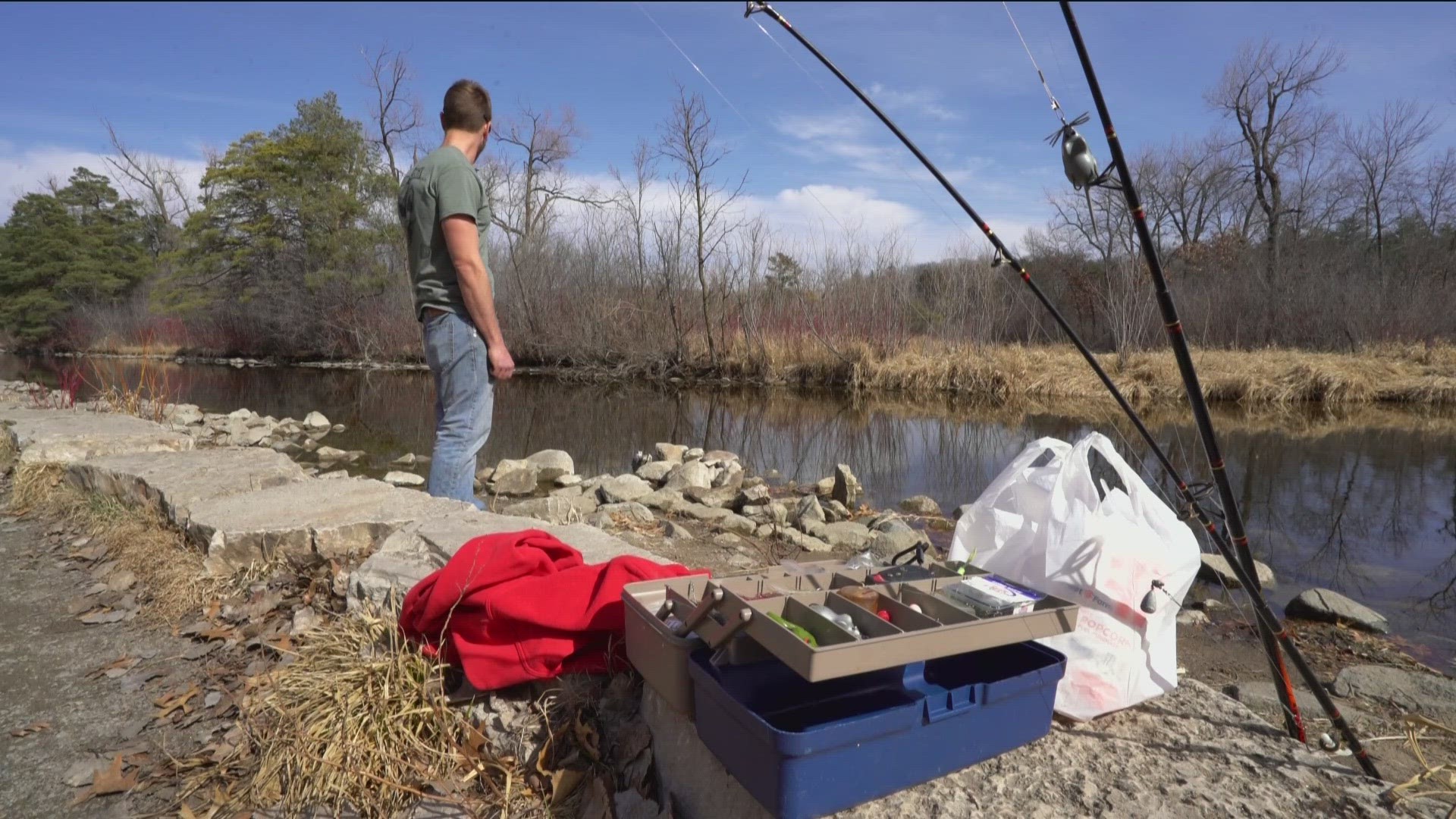VADNAIS HEIGHTS, Minn. — As anglers began to seek out Sucker Lake Channel in Vadnais Heights for an early taste of fishing on Monday, they were greeted by fresh signs cautioning against the use of lead fishing tackle and the impact it can have on trumpeter swans that flock to the waterway in the winter.
"For the last few years we've been trying to educate the public and partner with them on keeping lead out of this channel," said Ramsey County Parks and Recreation Director Mark McCabe, who spoke to KARE 11 while standing next to several different signs and notices that greet the public along the channel. "Lead fishing tackle can pose a risk to lots of birds, including loons, but the issue is concentrated here because the channel flows and remains open throughout the winter. Swans dive deep and they feed off the bottom and they end up ingesting the lead and dying from it."
It's a problem Ramsey County and the Vadnais Lake Area Water Management Organization (VLAWMO) have been tracking since 2019, when they documented 11 dead swans in and around the channel.
"This is the area that I come check regularly," said Dawn Tanner with VLAWMO during an interview with KARE 11 about the issue in February of 2020, following the discovery of yet another swan. "All of those tested found signs consistent with lead poisoning. We believe that they are picking up lead sinkers and that's what's causing the lead poisoning."
Despite that warning, the numbers have continued to climb in the years since.
"In the last five years now, they have documented 26 trumpeter swan deaths, which is a significant number," McCabe said.
"That's amazing. I didn't know," said Perry Franklin, who decided to visit the channel to fish with his son for the first time on Monday.
Though they were unaware of the scope of the problem, they couldn't miss the signs advising them to refrain from using lead tackle in order to protect the swan population.
"We usually don't use the lead a whole lot, we usually just use the hook and bobber," Franklin said. "But it's kind of hard to avoid (lead) with it in a lot of the tackle. I don't always know what's in it, but I suppose I don't always think about it."
McCabe said that's the goal of the newest signage, a recent public meeting on the topic and a new online survey geared toward the community.
But another angler who comes to the channel regularly said he doesn't believe many are rushing to toss their lead tackle, especially if it just means disposing of it in a recently installed drop box.
"It's cheaper... much cheaper," the angler said. "It's (less than) half the price of aluminum, and aluminum doesn't sink as fast."
In response to that cost concern - along with reservations about alternative metals - McCabe points out that Ramsey County did offer a few lead-free exchange events during the past two summers.
"During those we're handing out steel sinkers and steel jigs for people," McCabe said. "I think things have been received positively. I haven't heard any complaints, but I think it's just that getting 100% compliance is pretty difficult and we know there's a lot already out there. It just takes a miniscule amount of lead for a swan to be poisoned, unfortunately."
If the efforts don't show signs of changing that soon, McCabe says they may have to consider steering anglers away from the channel entirely.
"Short of probably prohibiting fishing or having legislative action that prohibits the sale of lead tackle, it's going to be a difficult issue to solve," he said.
Massachusetts and New Hampshire have both previously banned small lead fishing tackle, but it doesn't look likely in Minnesota this year.
Legislators here have introduced bills that have fallen short during the past two sessions, and there is no word that a similar effort will be made this year.
Those opposing lead tackle bans point to economic concerns for anglers and for states, which could see less demand for fishing licenses and more need for enforcement. They also maintain that lead tackle hasn't resulted in larger bird population issues.
Watch more Breaking The News:
Watch all of the latest stories from Breaking The News in our YouTube playlist:

